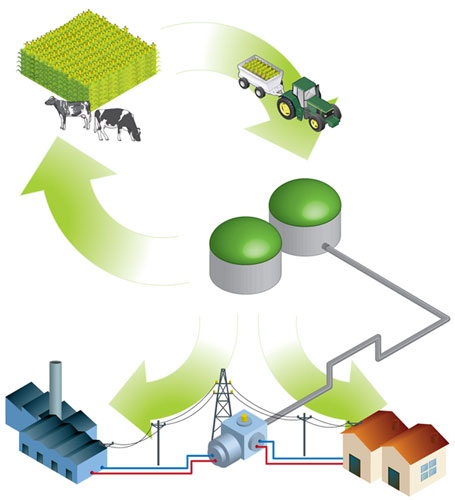Advantages
ADVANTAGES OF OPERATING A BIOGAS GENERATION FACILITY
- Instead of discarding postproduction agricultural waste, it is used to generate energy and organic fertilizer. In this manner, biogas technology contributes to ecological recycling and to decentralized processing of waste that could not be utilized in any other area. As a result, farms that cooperate in processing agricultural waste obtain a new socioeconomic position,
- Agricultural utilization of post-fermentation material results in significant savings in the purchase of artificial fertilizers. In many instances, post-fermentation material can be effectively used to replace mineral fertilizers, while the same time protecting groundwater against pollution,
- Limiting the emission of pollution from a 1.668MW biogas electrical power generation facility into the atmosphere, including: CO=64.34 Mg/year (reduction of 98.2%), particulates=85.82 Mg/year (reduction of 98.2%), SO2=72.08 Mg/year (reduction of 98.3%), NO2=5.15 Mg/year (reduction of 39.3%),
- Utilization of post-fermentation fertilizer from a biogas generation facility reduces the risk of polluting drinking water sources with nitrates and the eutrofization of surface water, allowing for major reductions in the use of mineral fertilizers. This is caused by the fact that 90% of the nitrogen contained in substrates subjected to fermentation is transformed into the form of ammonia. Nitrogen from ammonia is more readily absorbed by plants and more difficult to wash out of soils the nitrogen in nitrates.
ADVANTAGES FOR FARMERS
- More effective utilization of agricultural machinery and equipment,
- Additional revenue,
- Recycling of organic waste (manure, post-distillation residue) while simultaneously producing inexpensive fertilizer for farmers,
- ndependently owned energy generation facilities,
- Creation of new jobs,
- Production of electrical power, heat and fuels is a solid economic foundation for farmers,
- Ability to conclude long-term contracts for the delivery of substrate.
ADVANTAGES FOR COMMUNITIES
- Tax revenues for local administration, capital and tangible growth in the wealth of the district and local community,
- Reduction of unemployment, activation of local productivity,
- Taking advantage of non-arable and unutilized land,
- Reduction of agricultural products surpluses and providing additional revenue for farmers from raising energy crops,
- Recycling of organic waste (manure, post-distillation residue) while simultaneously producing inexpensive fertilizer for farmers.


